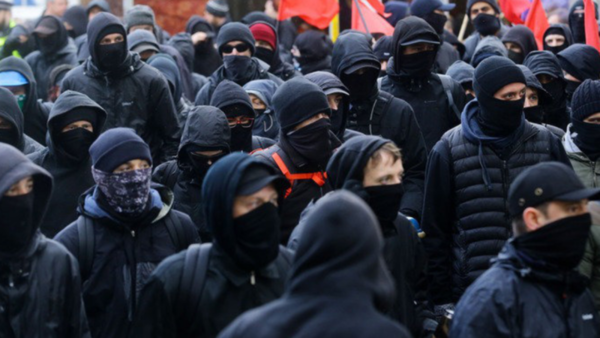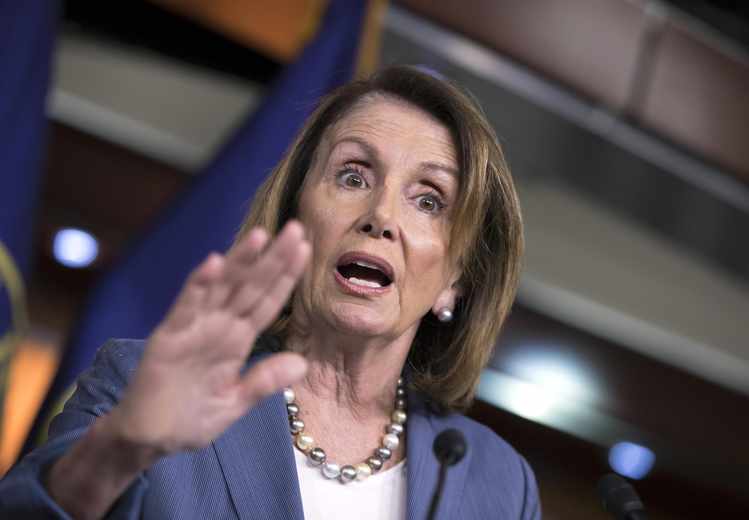They come wearing black, with masks covering their faces. They bring rocks, fireworks, jars of urine and boards with nails to attack those who disagree with them.
They are known as Antifa – short for anti-fascist – and they have become an often violent fixture at protests from Charlottesville, Va., to Seattle.
But while most visible when clashing with conservatives and police, they also reflect another uncivil war: the one pitting traditional liberals against more aggressive progressives.

This battle is not about the ends – both sides on the left believe that addressing income inequality and social and environmental justice are America’s most pressing issues. It is about the proper means to achieve those goals. And much of the fight revolves around free speech, especially whether “intolerant” viewpoints should be tolerated.
Left-wing internecine tensions intensified after violent confrontations between neo-Nazis and counter-protesters in Charlottesville on Aug. 12. President Trump’s claim that there was “violence on both sides” drew not only criticism of him but more scrutiny of progressives. Soon Democratic leaders were forced to respond, having remained largely silent as they drew energy from by Antifa, Black Lives Matter and campus protests.
When Antifa two weeks later attacked peaceful right-wing protesters marching against hate in Berkeley, Calif., denunciations from the left grew more frequent.
Berkeley Mayor Jesse Arreguin accused the group of “fighting hate with hate.” House Minority Leader Nancy Pelosi, the most high-profile Democrat to denounce the violence, released a statement that won praise from both right and left, although less so on the left.
“Our democracy has no room for inciting violence or endangering the public, no matter the ideology of those who commit such acts,” Pelosi said. “The violent actions of people calling themselves Antifa in Berkeley this weekend deserve unequivocal condemnation, and the perpetrators should be arrested and prosecuted.”

The violence, however, is only the most obvious sign of an ideological sea change on left. Although the terms liberal and progressive are often used interchangeably, they mean very different things, said Harvey Silverglate, a liberal civil rights attorney in Boston and co-founder of the Foundation for Individual Rights in Education.
Traditional liberals, who have long held sway in the Democratic Party, want to create “a kinder and gentler society, which is nonetheless fiercely devoted to providing civil liberties to all – including free speech as well as fair [due] process in criminal and disciplinary matters,” said Silverglate. The classic example is the ACLU’s effort in 1978 to allow Nazis to march in Skokie, Ill.
Progressives, he said, are committed to achieving their social and economic agenda “at whatever cost to civil liberties.”
They are more likely to support laws restricting “hate speech.” Many progressives – most notably those who have shut down speakers at Middlebury, Berkeley and other college campuses – argue that the First Amendment is a tool of oppression used by the privileged to brainwash the public. “The notion of freedom of speech is being co-opted by dominant social groups, distorted to serve their interests, and used to silence those who are oppressed and marginalized,” professors Kate Manne of Cornell and Jason Stanley of Yale wrote in the Chronicle of Higher Education.
Although many progressives argue that speech can be a form of violence, most are not prepared to join Antifa activists in saying it justifies a physically violent response.
There is, however, a growing acceptance of the idea that not all voices should be heard. In January 2014, for example, New York Gov. Andrew Cuomo suggested that “right-to-life, pro-assault-weapon, anti-gay” Republicans “have no place in the State of New York, because that’s not who New Yorkers are.”
Judith Shapiro, former president of Barnard College, told the Los Angeles Times: “The institution has the right to say: OK, is it worth it? ... Who should we be listening to and engaging with? Who, even if you disagree, could you actually learn something from?”
Shapiro was referring to conservative speakers invited to campus, but right-leaning speakers are not the only ones having their First Amendment rights threatened. Liberal administrators and professors are being attacked because they were seen as not progressive enough by students bent on enforcing “social justice.”
The antagonists are acting on convictions about what they see as truths or positions beyond challenge -- that climate change is settled science, opposition to same-sex marriage is bigotry, white males have “privilege,” and so on. It then doesn’t matter who disagrees with them, Democrat or Republican; dissenters are simply beyond the pale.
This inflexibility troubles Nadine Strossen, former president of the American Civil Liberties Union.

“There seems to be such a disconnect between the degree of anger and outrage that is felt and the supposed infraction, which is simply disagreeing. Not disagreeing on goals, not disagreeing on fundamental principles of justice,” Strossen told RealClearInvestigations. “In many cases that I think we’re talking about, we’re talking about people who are of the left who are committed to social reform, or are committed to racial justice, or are committed to social justice, but strongly disagree about strategy.”
In 2017 especially, the infractions have gotten smaller. For Allison Stanger, a political science professor at Middlebury College, simply arranging a debate – instead of demanding the speaker not be allowed to speak – resulted in an attack. For Bret Weinstein, a biology professor at Evergreen College, merely suggesting that it’s wrong to tell white students to leave campus resulted in threats against him and students patrolling the campus with baseball bats. The school had to be shut down for three days. (By comparison, the University of Texas shut down for just one day after an armed gunman opened fire on students in 1966.)
Strossen said that the sacrifice of civil liberties on college campuses isn’t new but is getting worse. She suggested it began in the late 1970s with feminists Catherine MacKinnon and Andrea Dworkin contending that pornography constituted violence against women. The two lost battles in the legal system, but their arguments appear to have won over many partisans in the culture wars, and are forebears of the hate speech codes and bias response teams on college campuses today.

Some administrators have taken a strong stand for the First Amendment. The University of Chicago in 2016 encouraged the incoming class to respect the free exchange of ideas. John Ellison, the dean of students, said the school would not support “trigger warnings,” would not disinvite speakers with whom students disagreed, and would not create “safe spaces” where students could “retreat from ideas and perspectives at odds with their own.”
As this school year began, professors from Harvard, Princeton and Yale signed a letter encouraging students to think for themselves, and insisted that the “actual bigots” are those who “fear open-minded inquiry and robust debate,” like those on campus who “seek to protect the hegemony of their opinions by claiming that to question those opinions is itself bigotry.”
No less a left-wing icon than Noam Chomsky followed suit last month in opposing calls for censorship of a Portland State University professor for writing a pro-colonialism article in a scholarly journal.
Laura Kipnis, a liberal Northwestern University media studies professor, has experienced the problem firsthand, and written a book about her own battles with campus censors.
“It’s easy to be a free speech fan when your feathers aren’t being ruffled,” she said.
“No doubt what makes me palatable to the anti-PC crowd is having thus far failed to ruffle them enough,” Kipnis added. “I’m just going to have to work harder.”



